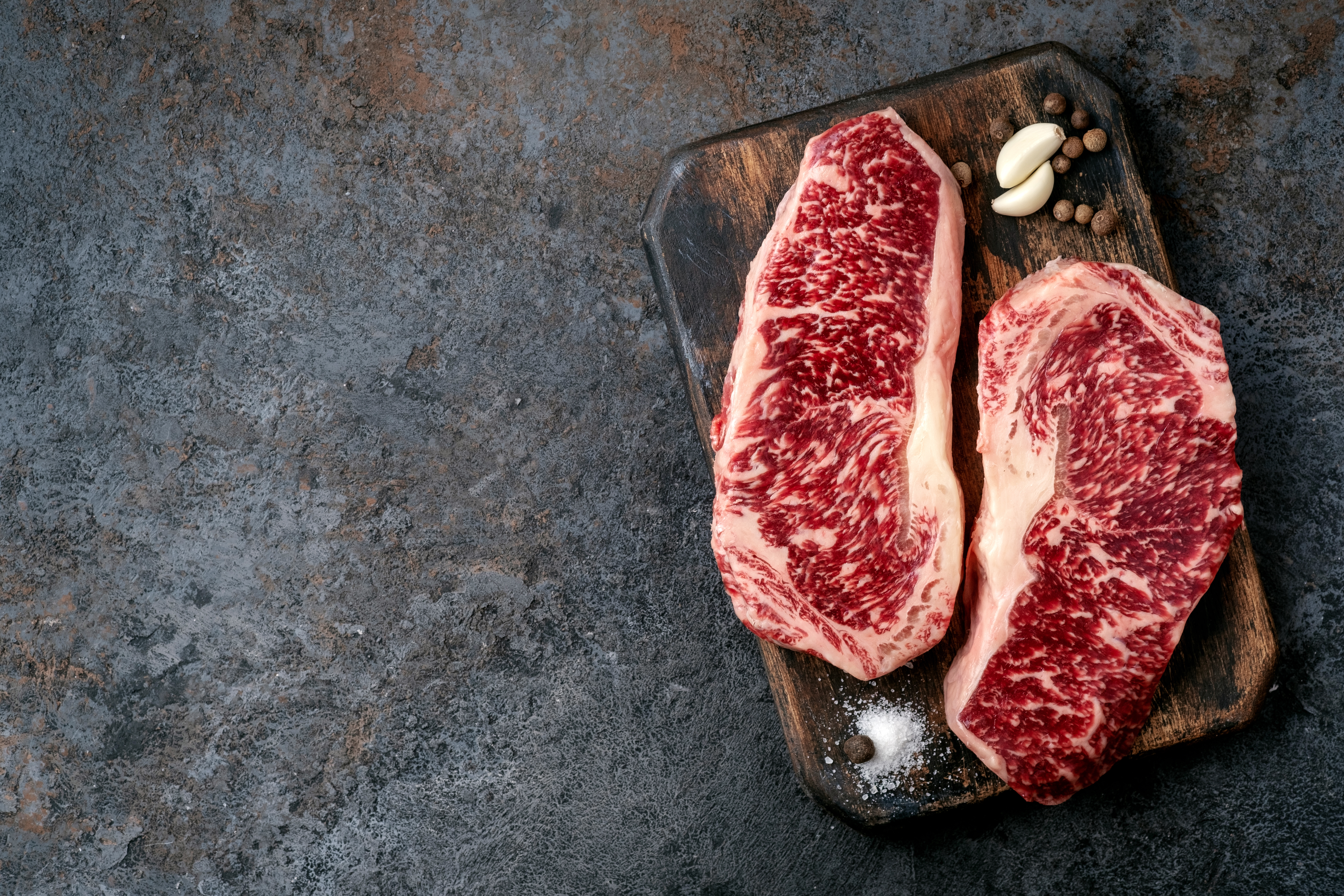Free digital copy
Get Speciality Food magazine delivered to your inbox FREE
Get your free copy
Customers who have heard of wagyu beef - by no means everyone - will tell you that the cows are treated to massage, beer and music, the meat is mouth-wateringly tender and the steaks are eye-poppingly expensive. They’re not wrong about the cost. At Malloy’s craft butchers in Cambridgeshire, the highest grade of Japanese wagyu fillet steak – A5 - changes hands at £295 a kilo.
Yet, at Christmas, discounter Aldi was offering wagyu beef tomahawk steaks for £24/kilo - a tenth of the price. This meat isn’t Japanese but British.
Start at the beginning, please. What does wagyu mean?
Wa means Japanese and gyu means beef. Wagyu (pronounced wa-gyoo) beef is famous for being super-marbled. This gives it an unusually tender and succulent texture, and a buttery, umami flavour. It comes from a Japanese breed with a genetic predisposition to lay down intra-muscular fat.
Isn’t fatty meat bad for us?
Wagyu contains high levels of omega fatty acids. The marbling is rich in omega-3 and omega-6, improving the ratio of monounsaturated fats compared with regular beef.
Do the cattle listen to Beethoven?
No, but they need a stress-free environment so they burn less fat and achieve correct marbling. They are fed for 600 days, double the time for other breeds.
Is Kobe beef the same as wagyu beef?
No. Kobe is a brand like Champagne. Japanese Wagyu beef may be called Kobe only if the animals are from the Tajima or Tajiri bloodlines, were born, raised and slaughtered in the Kobe region, and the meat is A5 grade.
Tell me about British wagyu beef
When they discovered that an injection of wagyu genetics into native breeds worked wonders for eating quality, British beef producers got busy, breeding and cross-breeding. Heard of a Jagyu? It’s a Jersey cow crossed with wagyu.
British Wagyu doesn’t yet have protected geographical indication status (PGI), however there are voluntary quality standards adopted by the British Wagyu Breeders Association.
An animal must have been born in the UK and its DNA be traceable back to Japan. If it is a cross-breed, it has to have been bred with a native breed such as an Aberdeen Angus, or a native dairy cow such as a Holstein.

Is appetite growing for wagyu?
Warrendale Wagyu in east Yorkshire supplies British Wagyu to Waitrose (beef sausages) and Aldi (award-winning beef burgers). Sales have grown from 10 carcasses a week five years ago to 130 finished cattle a week (Farmer’s Weekly).
Where’s the opportunity for fine food retailers?
It’s like caviar, Champagne or truffle oil. The mention of wagyu on a product or dish sounds extravagant, allowing you to charge a premium. How about Savoursmiths Wagyu Beef and Sweet Mustard hand-baked potato crisps for luxury hampers and picnics?
At Selfridge’s biltong bar, we came across no fewer than six types of wagyu biltong, bites and drywors. They ranged from choc-fed F1 (cross-bred) wagyu biltong at £12 for 100g, to traditional wagyu biltong £19.50 for 100g. The country of origin is the UK, and the choc-fed biltong allegedly comes from cattle fattened on Bourbon biscuits.
Whose wagyu beef products do you like?
A Wagyu Beef and Ale pie won a prestigious three Great Taste Award stars in 2023 and was a Supreme Champion nominee. The makers are Martins Handmade Pies & Ready Meals of Shropshire, and Homedene Farm Shop of Shawbury are stockists.
To find a supplier of wagyu beef near you, contact the British Wagyu Breeders Association or search online for local producers. The most affordable cut is probably rump, with sirloin second. Fillet is in short supply. Burgers are more available.
The arrival of British Wagyu allows ordinary mortals to taste a bit of the high life, doesn’t it?
Yes, and another surprising advantage is a more approachable eating experience. Not everyone wants super-soft beef that melts on the tongue, particularly if they are used to a meatier texture. Beef producer Chris Wilkinson breeds wagyu-Aberdeen Angus crosses. He says, “The buttery taste of a very well marbled Japanese Wagyu steak (say an A5) can be too much for the European palate.”
Will the trend last?
Time will tell. There is a mystique about wagyu, helped along by complicated grading systems which vary from country to country. Sky’s-the-limit restaurant prices create sky-high expectations.
Chris Wilkinson told us, “The Aberdeen-Angus Cattle Society surveyed 1,800 people. Above all, consumers want consistency when buying steak. If they have a bad eating experience, they won’t buy another steak for 12 weeks.”
In his view, wagyu cross-bred with dairy cattle – which is most British Wagyu because it’s cheaper to produce – may be less consistent.
Another challenge? The demonisation of fat persists. While Selfridges offers wagyu biltong, they don’t sell wagyu steaks on their fresh meat counter. “Our customers believe grass-fed organic beef is healthier,” the manager told us.
What’s the future of wagyu?
No farmers, just technicians. Northern Ireland-based food producer Finnebrogue has partnered with British cultivated meat company Ivy Farm Technologies on a project to create a lab-grown wagyu beef burger for UK retail. They are awaiting approval from the Food Standards Agency.